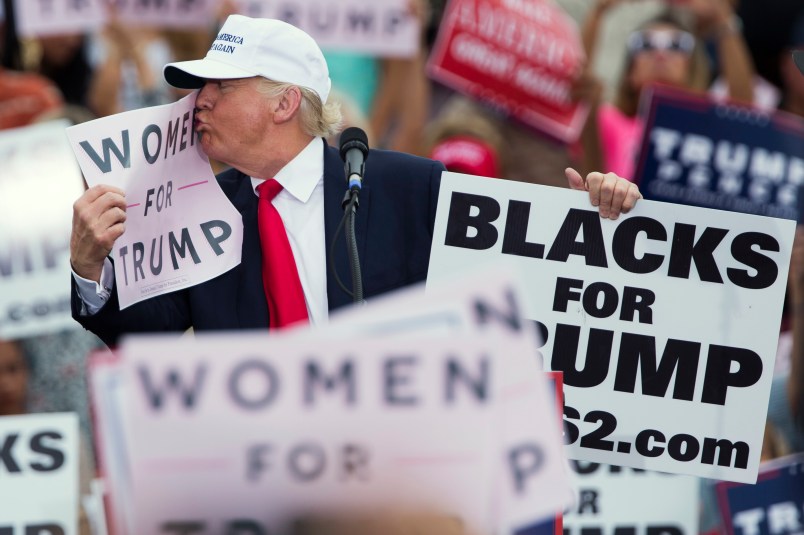The Trump administration is preparing to roll back the Obama-era free birth control mandate, a move legal groups say would be unconstitutional and subject to a court challenge.
The Wall Street Journal reported this week that the rule will be very similar to a draft version leaked in May, which would vastly expand the number and types of businesses eligible for an exemption from Obamacare’s rule requiring all employers to provide insurance coverage of all contraceptive methods without co-pays. If enacted as drafted, it would allow not only religious groups but thousands of non-profits and for-profit businesses to leave birth control out of their employees’ insurance altogether.
Lawyers at the American Civil Liberties Union, National Women’s Law Center and other groups say such a rule would violate government process rules, gender discrimination laws, the separation of church and state.
A key provision of the Affordable Care Act made more than a dozen preventative care services available free of charge for people covered by health insurance—from primary care checkups to vaccines to diabetes screenings. The only service targeted by the Trump rule change is coverage of contraception.
“This raises a couple of constitutional issues, including sex discrimination, because they’re singling out care that only women need,” explained Brigitte Amiri, a staff attorney with the ACLU. “They are not targeting other kinds of preventative care, and they’re taking away a benefit that’s otherwise guaranteed by law. Additionally, they’re targeting something, contraception, that allows women to achieve equality in society.”
Amiri, who helped write the ACLU’s brief defending the birth control rule before the Supreme Court in 2014, said the rule could also be challenged as a violation of the Constitution’s Establishment Clause, which dictates a separation between church and state.
“This rule allows employers to impose their religious beliefs on their employees,” she told TPM. “When you take a job at a church you know what you’re signing up for, but that’s very different than taking a job at a craft store or a university.”
Under current law, a very narrow set of employers—essentially, only houses of worship—are exempt from the birth control mandate. They are allowed to offer health insurance that does not cover contraception, and their employees must pay out of pocket to access it. Following the Supreme Court’s Hobby Lobby decision in 2014, a slightly larger group of employers became eligible for an “accommodation”—they do not have to provide birth control coverage to their employees, but their employees can still access it without copays through the insurance company. Religious non-profits and “closely held” for-profits whose owners claim they have a religious objection to contraception can apply for the accommodation—the subject of several ongoing lawsuits.
The Trump administration’s draft leaked in May would blow up this delicate balance in three major ways.
For one, the Obama administration argued for years in court that the government has a compelling public health interest in fully covering contraceptives. In the new rule, the Trump administration reverses that position.
“They go to great lengths to explain why there’s no compelling justification for requiring employers and universities to cover [birth control for] their employees or students,” health law specialist Timothy Jost told TPM back in June.
Secondly, the new rule would allow all companies and organizations that currently use the accommodation to get the exemption instead, meaning all of their employees and their dependents would lose access to contraceptive coverage. While it’s difficult to calculate the exact impact of this change, a Kaiser survey in 2015 found that 3 percent of all non-profits in the country were requesting the accommodation, including 10 percent of all large non-profits with more than 5,000 workers. If all of those entities opted for the exemption, hundreds of thousands of women would lose access to no-cost contraception.
“Under Obama administration’s regulations, we know that the women getting the accommodation are still getting their birth control without any out-of-pocket costs. But with this rule, people would have no coverage at all,” said Mara Gandal-Powers, senior counsel at the National Women’s Law Center, another group preparing legal action if the rule goes into effect. “The same cost barriers that existed before the ACA would be back, and that’s really disturbing.”
Third, the rule would allow employers to claim a “moral objection” to providing contraceptive coverage in their health insurance, not just a “religious objection” as the law currently allows. The draft of the rule does not define what constitutes a “moral objection.”
“This vastly expands the universe of employers who could claim an exemption,” said Adam Sonfield, the senior policy manager at the Guttmacher Institute. “And it’s not clear what procedures, if any, they would have to go through to declare that they have a religious or moral objection. There is nothing in the leaked draft, at least.”
The Department of Health and Human Services could release the new rule at any time. If it remains close to the earlier leaked draft, it will be an interim final rule.
“It’s an emergency procedure for it to go into effect immediately,” Sonfield explained. There’s a comment period, but it doesn’t really matter, because it’s happening after the fact. When the government uses this procedure, they need to justify it. I don’t know how they’re going to justify this.”
Since November, fears of the Trump administration axing the birth control mandate has led to a massive spike in requests for long-lasting contraceptives like IUD that cost hundreds of dollars out-of-pocket before the Affordable Care Act, and could again become unaffordable for many women.










